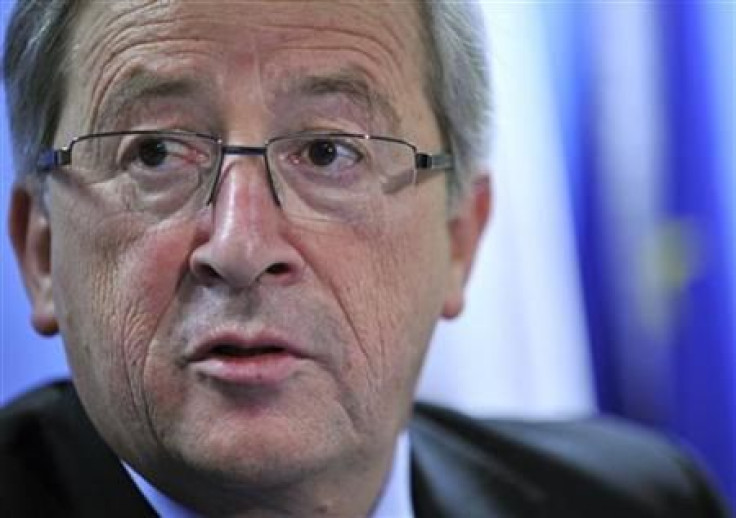Jean-Claude Juncker Is Now President Of The European Commission. Here's What Comes Next

The European Parliament selected Jean-Claude Juncker, a former prime minister of Luxembourg, as the new president of the European Commission on Tuesday, following a controversial debate over both Juncker’s past and the direction of the commission itself. Juncker will succeed Jose Manuel Barroso, whose 10-year tenure saw the addition of 12 new European Union member states and the passage of the Treaty of Lisbon, arguably the continent’s most significant binding document. The 59-year-old native of Redange, Luxembourg, will begin a five-year term as the continent’s chief executive on Nov. 1.
The European Commission is the executive arm of the 28-member EU, but its presidency lacks the political mandate of the heads of government of each member state. Still, Juncker’s selection made waves across a continent roiled by internecine divisions, namely over fiscal austerity in Southern Europe and on how to deal with Russia. Juncker also assumes office during a period of intense Euroskepticism, after far-right nationalist parties made gains in several European Parliament elections this year. Two of the EU's most skeptical leaders, Britain’s David Cameron and Hungary’s Viktor Orban, opposed Juncker’s selection, citing concerns that the European Commission will attempt to centralize power in Brussels.
Long-term trends aside, Juncker and the European Commission must first contend with a number of immediate issues concerning the commission’s composition and direction.
The Gender Problem
The EU’s 28 member states are each responsible for choosing one member for the European Commission, and thus far, only two female candidates have been announced -- far fewer than the eight or nine preferred by the European Parliament. Juncker has called upon member state governments to nominate more women, and he has promised to give each female commission member an important policy portfolio.
The Russia Problem
The European Parliament is expected to announce a successor to Catherine Ashton, the commission’s top foreign policy official, on Wednesday. According to the Guardian, Italian Prime Minister Matteo Renzi has pushed Federica Mogherini, the country’s foreign minister, as Ashton’s replacement, despite Mogherini’s comparatively limited foreign policy experience. Veteran Polish Foreign Minister Radek Sikorski is also apparently interested in the position.
Europe faces a number of foreign policy issues, not least of which is what to do about immigrants arriving from Africa and the Middle East. But probably the biggest source of division concerns Russia, which roiled the continent this April when it seized Crimea from Ukraine but also supplies a large part of the EU's energy through its oil and gas exports. Renzi and Mogherini are thought to favor a more conciliatory policy toward Moscow. Sikorski may promote more hardline policies toward Russia, Poland's traditional adversary.
The Austerity Problem
During his candidacy for the European Commission’s presidency, Juncker earned the crucial support of the continent’s southern leaders through a pledge to reconsider Europe’s austerity policies, which mandated that Southern European countries make painful reforms in exchange for fiscal support. Such policies tend to be unpopular in countries including Italy, Spain and Greece, with shrinking economies and relatively high levels of debt, which had to enact severe budget cuts after the 2008 global financial crisis. They are much better received in Germany, the biggest European economy, whose electorate tends to view those cuts as a way for Southern European nations to maintain fiscal discipline.
In remarks given to the European Parliament on Tuesday, Juncker said he did not believe Europe “can build sustainable growth on ever-growing mountains of debt” and pledged to unleash 300 billion euros in public and private investment over the next three years.
Juncker’s support for rethinking austerity provided him with a direct personal benefit -- Italy, a founding member and the third-biggest economy in the euro area, may otherwise have not supported him for the job. Meanwhile, Juncker must also make peace with the British, whose prime minister, David Cameron, strongly opposed Juncker’s nomination. Britain has expressed reservations about tighter integration with Europe, and it plans to hold a referendum in 2017 on whether to stay in the E.U.
One thing to watch for in the coming days will be whether Juncker can mollify the British by giving their commissioner a prominent policy portfolio. But in the meantime, Juncker has at least reassured London that no new nations will join the continent’s governing bodies during his years -- a blow to Scottish hopes for independence.
© Copyright IBTimes 2024. All rights reserved.












